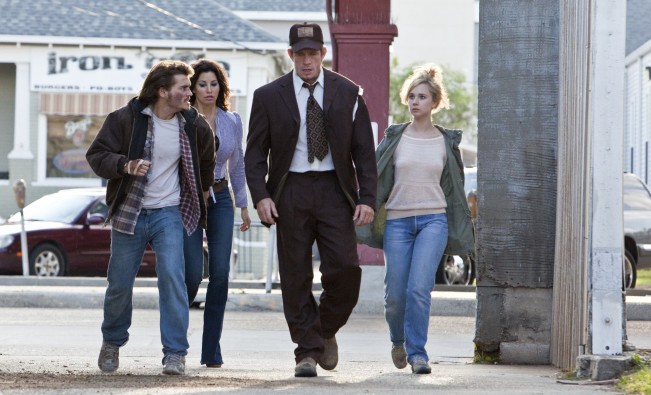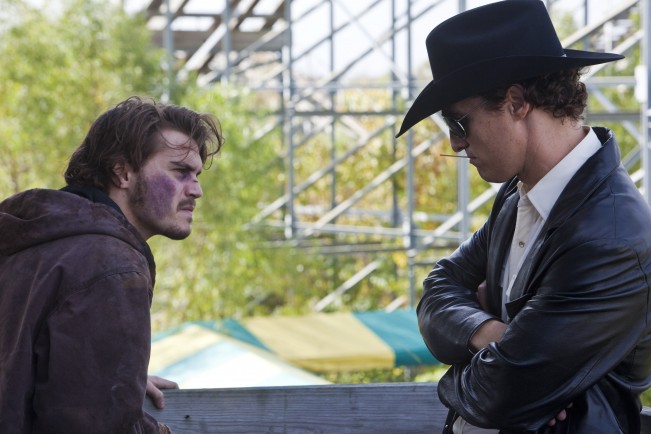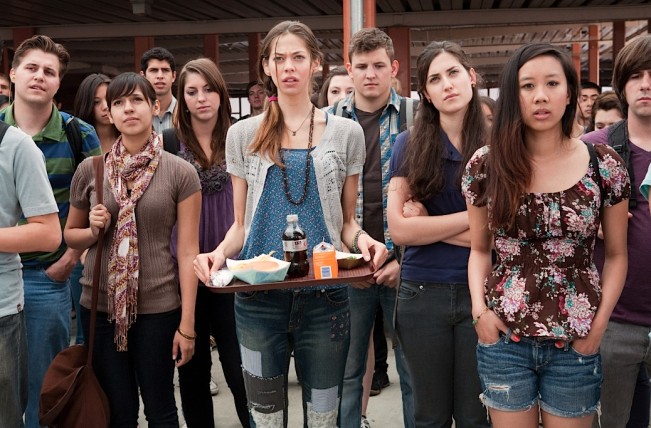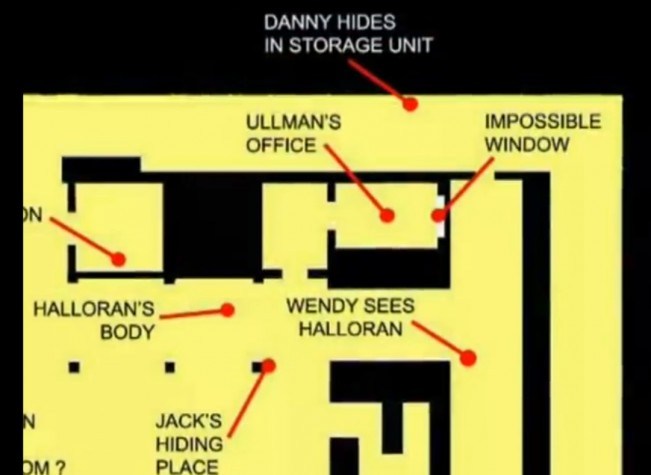Movie City Indie Archive for July, 2011
Jerry Lewis And Al Goldstein Talk Gadgets On “A.M. New York” (8’55”)
http://youtu.be/6A98NnK8IWo&feature=player_embedded
[Via the Safdie Bros.]
Mark & Kent Osborne’s THE EXHIBITIONIST (4’16”)
“A man and his suitcase take an extraordinary pixilated journey through MOCA’s exhibition Art in the Streets at The Geffen Contemporary at MOCA, as works by BANKSY, RAMMELLZEE and KENNY SCHARF come alive all around him. Directed by brothers Mark Osborne (MORE and KUNG FU PANDA) and Kent Osborne (ADVENTURE TIME, SPONGEBOB SQUAREPANTS), this short film was created in an improvisational fashion during three very busy days at the museum.”
Chris Marker Turns 90

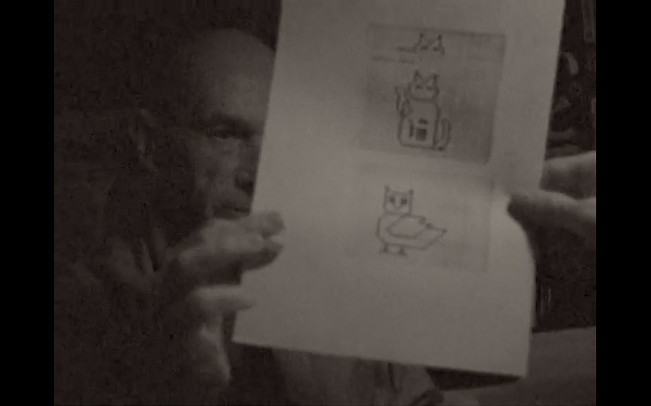


http://www.youtube.com/watch?v=p02exv6ngaE&feature=player_embedded
Kurt Loder Says There’s This Thing Called Teh Internets?
http://www.youtube.com/watch?v=FmboEjwJwFU&feature=player_embedded
It’s Hot-Heat-Hot Outside, But This Is The Only BLACKOUT You Need
[Credits at the link.]
TIFF11: First Images From Friedkin’s KILLER JOE
Premiering in Toronto: the second William Friedkin–Tracy Letts collaboration after batshit Bug. Punchy!
STUPID, CRAZY, LOVE.: Is the one in the middle a star yet?
Analeigh Tipton, center. The “babysitter in the car” scene is weirdly more anguished, more touching, more terrifying, than the ones in Atom Egoyan‘s Exotica. Wow and-how.
8 Comments »THE DEVIL’S DOUBLE: “Transformation” (60 sec)
http://www.youtube.com/watch?v=XrseHj_Wa5U&feature=player_embedded
The YouTube floating ad that keeps popping up is for gold. Uday Hussein would approve.
Got Wood? Heds Up For An End To Vinnie’s Plenty
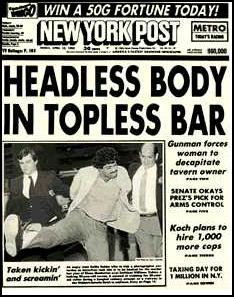 V. A. Musetto has left his Post after editing its film section for 25 years. As a movie reviewer, he’s got swell taste and has said he’ll continue to contribute. He writes headlines, too. And what headlines! Here’s how he described that gift to People magazine in 1987: “Zap, zip, zonk, nix, those are good verbs. Short. Short and powerful. They’ve got to convey a sense of urgency. Nouns? Tots, kids, fire, you know—SIX-ALARM FIRE. Blaze is good, but fire’s shorter. Siege. Siege is good. Madman, maniac, fear. My favorite word is ‘coed.’ When you see coed, people want to buy the paper. I don’t know why—just some young, innocent girl getting into a lot of trouble. It’s the dirty old man in people. It’s a very sexy word…Without the hyphen. Some people spell it with a hyphen, we spell it without the hyphen.”
V. A. Musetto has left his Post after editing its film section for 25 years. As a movie reviewer, he’s got swell taste and has said he’ll continue to contribute. He writes headlines, too. And what headlines! Here’s how he described that gift to People magazine in 1987: “Zap, zip, zonk, nix, those are good verbs. Short. Short and powerful. They’ve got to convey a sense of urgency. Nouns? Tots, kids, fire, you know—SIX-ALARM FIRE. Blaze is good, but fire’s shorter. Siege. Siege is good. Madman, maniac, fear. My favorite word is ‘coed.’ When you see coed, people want to buy the paper. I don’t know why—just some young, innocent girl getting into a lot of trouble. It’s the dirty old man in people. It’s a very sexy word…Without the hyphen. Some people spell it with a hyphen, we spell it without the hyphen.”
The mechanics are simple, the punch is simpler: “Writing headlines is being able to say a complex story in three or four words that will attract a reader. It’s like advertising on TV.” But it’s day-to-day, hed-to-hed combat. “Anybody can put a newspaper out when it’s all happening—if they shoot the President of the United States. It’s when nothing’s happening—you have no stories, you have no photos—that’s the pits. That’s when you really earn your money. I wrote HEADLESS BODY IN TOPLESS BAR, the most infamous headline in journalism.”
 But that memorable slug is a shrug to Musetto. “It’s not one of my favorite headlines… One afternoon I got a report that there had been a murder in a bar, and that one of the victims had had his or her head cut off. Someone said it might be a topless bar, but we weren’t sure, and then the idea of the headline came around, so we were really questioning to make sure it was a topless bar. We sent the reporter, this girl, and she so determined that it was a topless bar. I just wrote it, and everyone said ‘ha ha,’ but I didn’t think it would live in infamy.” His personal favorite? “GRANNY EXECUTED IN HER PINK PAJAMAS. It was about a woman who went to the electric chair, and she wanted to wear her pajamas rather than prison garb, so they let her. I don’t think you could pass that headline without reading the story. You see that headline and you immediately want to know what it’s about. It’s just the picture of this woman, this poor woman, you feel sorry for her, she killed somebody but you still feel sorry for her.”
But that memorable slug is a shrug to Musetto. “It’s not one of my favorite headlines… One afternoon I got a report that there had been a murder in a bar, and that one of the victims had had his or her head cut off. Someone said it might be a topless bar, but we weren’t sure, and then the idea of the headline came around, so we were really questioning to make sure it was a topless bar. We sent the reporter, this girl, and she so determined that it was a topless bar. I just wrote it, and everyone said ‘ha ha,’ but I didn’t think it would live in infamy.” His personal favorite? “GRANNY EXECUTED IN HER PINK PAJAMAS. It was about a woman who went to the electric chair, and she wanted to wear her pajamas rather than prison garb, so they let her. I don’t think you could pass that headline without reading the story. You see that headline and you immediately want to know what it’s about. It’s just the picture of this woman, this poor woman, you feel sorry for her, she killed somebody but you still feel sorry for her.”
Not many people have done the job so well for so long. He’d dreamt of it always. “For some reason I was always good at writing headlines. I think it had to do with my childhood, reading newspapers… I read the Post, the Herald Tribune, the Daily Mirror, the Daily News, the Journal-American and the World-Telegram. There were seven papers in New York City then; it was great. I used to dream about writing front-page headlines.”
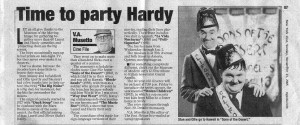 “I came to the Post in 1975,” Musetto recalled to People. “The Post was dying before Murdoch bought it. It probably would have gone out of business. The woods—we call headlines “woods” because big type used to be made of wood—were always, you know, basic woods. Murdoch brought in a lot of guys who used Fleet Street-type headlines… “I WANT MY ROSARY BEADS.” We ran that a little while ago. Previously the headline would have read PRISONER SAYS HE ASKED POLICE FOR HIS ROSARY BEADS. And the headlines became physically bigger. I thought it was great. Murdoch sort of made headlines pop art.”
“I came to the Post in 1975,” Musetto recalled to People. “The Post was dying before Murdoch bought it. It probably would have gone out of business. The woods—we call headlines “woods” because big type used to be made of wood—were always, you know, basic woods. Murdoch brought in a lot of guys who used Fleet Street-type headlines… “I WANT MY ROSARY BEADS.” We ran that a little while ago. Previously the headline would have read PRISONER SAYS HE ASKED POLICE FOR HIS ROSARY BEADS. And the headlines became physically bigger. I thought it was great. Murdoch sort of made headlines pop art.”
There’s something about wood: “Writing headlines is a good way to impress a woman. When you first meet her you tell her what you do. And then when she’s walking down the street, she sees this headline, and she says, “Oh, he wrote that. That guy I went out with last night wrote that.” And when you break up, they can’t ignore you. You’re on every newsstand. There’s no escape.” [More at the link.]
[A misattribution of one of Musetto’s titles has been corrected; h/t Lou Lumenick.]
The FT On Ryan Kavanaugh
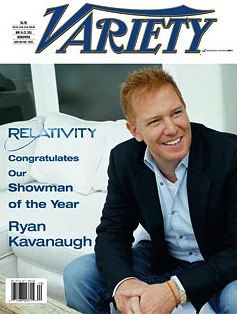 The Financial Times’ Matthew Garrahan writes up a compelling read on the rise and rise of Relativity Media’s Ryan Kavanaugh (FT free access for limited number of articles monthly): “At just 36, the redheaded Kavanaugh has already produced more than 30 movies. He has raised billions… from Wall Street firms, money which has been invested in more than 100 films released by Hollywood studios,” Garrahan introduces, including snips from Kavanaugh’ press, such as when Variety “declared that Kavanaugh ‘eschews sleep, clocking a mere 90 minutes to two hours a night,’ and revealed, among other things, that when not producing movies he spends his time ‘working with sick kids in hospitals,’ practicing ‘transcendental meditation’ and ‘closing in on a cure for cancer’ through his involvement with a bio-tech venture.” Garrahan sifts through the origins and history of Relativity even as Kavanaugh refuses an interview. “Kavanaugh was new to the party and spoke openly about how he was going to fix a broken entertainment industry that he claimed wasted too much money. This made him as many enemies as friends… Does he have what it takes to stay in the game as one of Hollywood’s most influential players? … He doesn’t dress like a movie mogul and usually wears jeans, Converse trainers and a shirt with a black tie askew. His grandparents were Holocaust survivors… A number-cruncher adept at structuring complex financial deals, perhaps his biggest talent is his charm, with few in Hollywood rivaling his skill as a salesman. He has earned notoriety in the business for his lavish spending: at one dinner at the Ago restaurant… Kavanaugh left a $20,000 tip, according to someone who claimed they saw the credit card receipt. Relativity would not comment on the terms of Kavanaugh’s remuneration package but the company’s growth has given him access to perks enjoyed by other studio heads such as use of a corporate jet…” The VF-style detail entertains, but it’s the narrative of the company’s fortunes that makes it a must-read. “Hollywood is watching closely, keen to see if renewed Wall Street interest in owning entertainment companies is real or, like so much else in Hollywood, a carefully crafted mirage. But Kavanaugh has worked in the movie business long enough now to know that a good film has to have a compelling third act.” [The history at the link.]
The Financial Times’ Matthew Garrahan writes up a compelling read on the rise and rise of Relativity Media’s Ryan Kavanaugh (FT free access for limited number of articles monthly): “At just 36, the redheaded Kavanaugh has already produced more than 30 movies. He has raised billions… from Wall Street firms, money which has been invested in more than 100 films released by Hollywood studios,” Garrahan introduces, including snips from Kavanaugh’ press, such as when Variety “declared that Kavanaugh ‘eschews sleep, clocking a mere 90 minutes to two hours a night,’ and revealed, among other things, that when not producing movies he spends his time ‘working with sick kids in hospitals,’ practicing ‘transcendental meditation’ and ‘closing in on a cure for cancer’ through his involvement with a bio-tech venture.” Garrahan sifts through the origins and history of Relativity even as Kavanaugh refuses an interview. “Kavanaugh was new to the party and spoke openly about how he was going to fix a broken entertainment industry that he claimed wasted too much money. This made him as many enemies as friends… Does he have what it takes to stay in the game as one of Hollywood’s most influential players? … He doesn’t dress like a movie mogul and usually wears jeans, Converse trainers and a shirt with a black tie askew. His grandparents were Holocaust survivors… A number-cruncher adept at structuring complex financial deals, perhaps his biggest talent is his charm, with few in Hollywood rivaling his skill as a salesman. He has earned notoriety in the business for his lavish spending: at one dinner at the Ago restaurant… Kavanaugh left a $20,000 tip, according to someone who claimed they saw the credit card receipt. Relativity would not comment on the terms of Kavanaugh’s remuneration package but the company’s growth has given him access to perks enjoyed by other studio heads such as use of a corporate jet…” The VF-style detail entertains, but it’s the narrative of the company’s fortunes that makes it a must-read. “Hollywood is watching closely, keen to see if renewed Wall Street interest in owning entertainment companies is real or, like so much else in Hollywood, a carefully crafted mirage. But Kavanaugh has worked in the movie business long enough now to know that a good film has to have a compelling third act.” [The history at the link.]
Listening to ANOTHER EARTH
A video by Rupert Creswell for the weirdly beautiful “The First Time I Saw Jupiter,” by Brooklyn band Fall On Your Sword, composers of the score to Another Earth. There’s a moment near or at the end of the movie where it kicks in one last time and… lovely.
The financing of low-low-budgeted Another Earth is unusual, reports ace analyst Gregg Goldstein at Variety (paywall) in “Microbudget success boosts nonprofit: Nonprofit shingle turns brings in su[r]prising coin on ‘Earth.'” “Artists Public Domain just scored one of the most profitable sales in the history of Sundance. It’s celebrating a 10-year anniversary. But even if you’re in the film industry, chances are you’ve never heard of this nonprofit producer,” Goldstein introduces. 2008’s Momma’s Man was an earlier production, but it wasn’t the success Another Earth is even before theatrical release. The New York-based nonprofit was paid close to $3 million for Mike Cahill and Brit Marling’s reportedly $150,000 production. Goldstein computes that those figures mean, that despite added costs to make the film ready for delivery to Searchlight, it’s made back ten times its investment. Ah, but here’s the rub: “Under APD’s 501(c)(3) charity rules, none of the filmmakers can profit from it.” “It’s the first time we’ve ever had a film that’s in profit,” co-founder Hunter Gray told Variety. “We’ve never held a fundraiser, we don’t have any employees and we have very little overhead… No one on the board gets paid, and we can never take money out.” Deferred fees can be paid once an APD project makes money, but there are no traditional “points.” Goldstein weighs the intriguing implications (and complications) in the full article at the link.
1 Comment »Soderbergh x 2
Ten days and another Soderbergh trailer? Two of the smartest scripts I’ve read this year make a couple of impressive trailers? Plus! At Comic-Con, Soderbergh says rumors of his “retirement” was gossip from Matt Damon after drinks… Good.
2 Comments »“Godard, Go” Photo Book
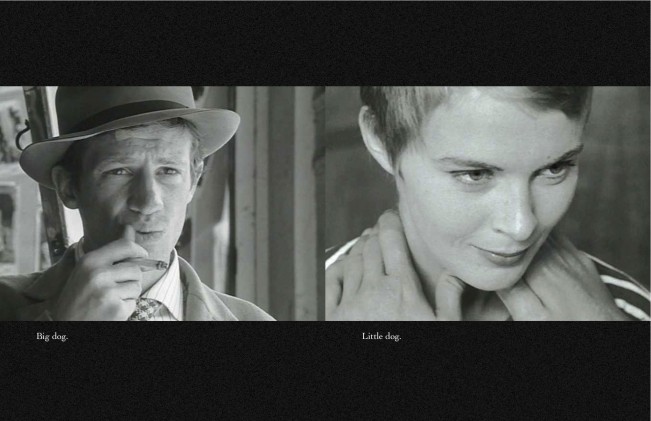
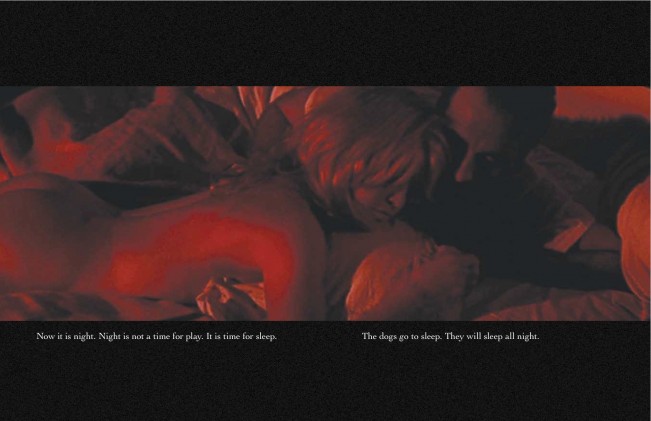
Friday, I’m in love. “It takes two to make an image,” Godard is cited as the epigraph to this photo experiment. Another bricolage in the wall: download the 40-page PDF is here.
The Psychology Of THE SHINING’s Spatial Dislocations (11’37”)
“How Stanley Kubrick used Escher-styled spatial awareness and set design anomalies to disorientate viewers of his horror classic The Shining. Written, narrated and edited by Rob Ager.”





